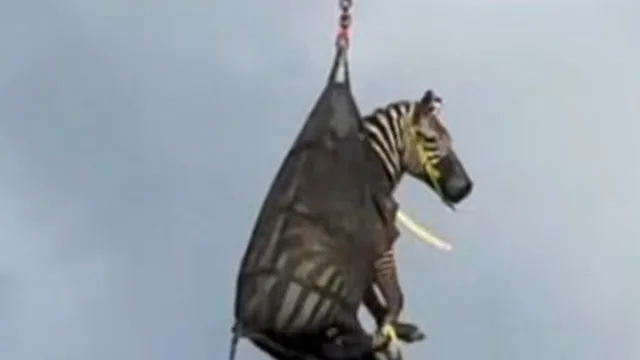
Pet zebra Ed captured after causing chaos in Tennessee
2025-06-12 07:29- Ed the zebra escaped from his owners in Christiana, Tennessee, and was missing for a week.
- His adventures forced traffic shutdowns on Interstate 24 and turned him into an internet sensation.
- He was successfully captured through a coordinated rescue operation involving aerial support, with no injuries reported.
Express your sentiment!
Insights
In Tennessee, a pet zebra named Ed became the center of public attention after escaping from his owners on May 31 and eluding capture for eight days. The zebra initially arrived in Christiana on May 30, and his owner reported him missing the following day. Numerous sightings were reported as Ed ventured through a cul-de-sac and crossed highways, leading to various traffic disruptions on Interstate 24 due to his unexpected escapades. The Rutherford County Sheriff's Office even had to close lanes of traffic to ensure public safety during Ed's adventures. On June 6, Ed was spotted in a field, and drone technology was employed to track him safely. The sheriff's office coordinated a rescue operation with their aviation crew, eventually locating him on June 8 in a pasture near a subdivision. Video footage captured the moment Ed was airlifted by helicopter, wrapped in a net before being transported back to an animal trailer. This dramatic rescue was followed by relief from both his owners and authorities involved. Ed's antics gained significant media coverage, transforming him into an internet sensation during his week of freedom. Social media was inundated with posts and memes featuring Ed, with imaginative narratives of him visiting various locations and even dining at a popular southern restaurant. The zebra’s escape highlighted the logistical challenges related to keeping exotic pets safe while also raising awareness about the responsibilities of pet ownership. At the conclusion of the chase, Ed was confirmed to be healthy. His owner, Laura Ford, expressed gratitude for the safe resolution, noting the stressful nature of the situation. The sheriff's office reiterated the importance of ensuring animal safety and the proactive responses by local law enforcement and volunteers that ultimately led to Ed's safe return home.
Contexts
The impact of exotic pet ownership in urban areas is a multifaceted issue that has garnered considerable attention due to its implications on public health, environmental concerns, and animal welfare. Exotic pets, defined as species not commonly domesticated, have become increasingly popular among urban residents seeking unique companionship. However, the rise in popularity has led to significant ecological risks and public health challenges. Many exotic species are not well-suited to urban environments, resulting in potential escapes or releases into local ecosystems, which can disrupt native wildlife and lead to unforeseen consequences. Moreover, with the transport of these animals, there exists an increased risk of zoonotic diseases, which can be transmitted from animals to humans, posing a public health threat and straining healthcare systems in urban areas. Additionally, the welfare of exotic pets raises serious ethical concerns. Many exotic animals have highly specialized care needs that are not easily met in domestic settings. Information regarding their needs—such as diet, space, social interaction, and environmental enrichment—is often insufficiently understood by pet owners. As a result, many exotic pets suffer from stress, poor health outcomes, and shortened lifespans due to inadequate care. Furthermore, the commercialization of exotic pets can promote illegal wildlife trade, contributing to population declines in the wild and negatively impacting biodiversity. Public education regarding the responsibilities of exotic pet ownership is crucial to address these issues and to promote more informed decision-making among potential pet owners in urban environments. Urban planning and policy also play an essential role in managing the impact of exotic pet ownership. Cities often lack comprehensive regulations concerning the ownership of exotic animals, which can lead to a patchwork of laws and enforcement challenges. Implementing stricter regulations and providing guidelines for responsible pet ownership can mitigate the negative consequences associated with exotic pets. This includes proactive measures such as licensing exotic pets, establishing veterinary care standards, and ensuring public awareness campaigns about the potential risks involved with such animals. Effective regulation can help maintain urban biodiversity and protect public health while allowing for responsible ownership of exotic pets. In conclusion, the impact of exotic pet ownership in urban areas necessitates a careful examination of the balance between individual desires for unique pets and the broader implications for society and the environment. Stakeholders, including policymakers, veterinary professionals, and animal welfare organizations, must collaborate to address this complex issue. By enhancing public education and enforcement of responsible ownership practices, communities can mitigate risks while also ensuring the wellbeing of both exotic pets and local ecosystems. The responsible management of exotic pet ownership is vital for fostering a harmonious coexistence in urban settings.